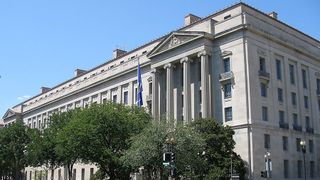Trump Administration Sues California Over Net Neutrality Law

The Department of Justice has filed suit against the state of California after Gov. Jerry Brown Sunday signed the state's tough new network neutrality law.
The law essentially restored the bright-line rules against blocking, throttling and paid prioritization, that the FCC under chairman Ajit Pai had eliminated in the Restoring Internet Freedom Order last fall. The California law went even further, extending them to interconnections, which the FCC's 2015 Open Internet order, which implemented the rules, didn't even do.
The Restoring Internet Freedom order also made clear it preempted state efforts to re-regulate ISPs.
DOJ said the California law "unlawfully imposes burdens on the Federal Government’s deregulatory approach to the internet...The United States concluded that California, through Senate Bill 822, is attempting to subvert the Federal Government’s deregulatory approach by imposing burdensome state regulations on the free internet, which is unlawful and anti-consumer."
Related: Amazon Slams California Privacy Law
“Under the Constitution, states do not regulate interstate commerce—the federal government does. Once again the California legislature has enacted an extreme and illegal state law attempting to frustrate federal policy," said Attorney General Jeff Sessions. "The Justice Department should not have to spend valuable time and resources to file this suit today, but we have a duty to defend the prerogatives of the federal government and protect our Constitutional order. We will do so with vigor. We are confident that we will prevail in this case—because the facts are on our side.”
FCC chair Ajit Pai agreed.
Broadcasting & Cable Newsletter
The smarter way to stay on top of broadcasting and cable industry. Sign up below
“I’m pleased the Department of Justice has filed this suit," said Pai, whose statement was included in Justice's announcement of the suit. "The internet is inherently an interstate information service. As such, only the federal government can set policy in this area. And the U.S. Court of Appeals for the Eighth Circuit recently reaffirmed that state regulation of information services is preempted by federal law."
Related: Court Boosts Case in Net Neutrality Fight
“Not only is California’s internet regulation law illegal, it also hurts consumers," said Pai. "The law prohibits many free-data plans, which allow consumers to stream video, music, and the like exempt from any data limits. They have proven enormously popular in the marketplace, especially among lower-income Americans. But notwithstanding the consumer benefits, this state law bans them.
In June, California passed a privacy bill that established a consumer right of privacy, though one based on disclosure and the right to opt out of data collection or third-party sharing, and to have their data deleted if they chose. The bill does not go into effect until 2020.
"This is no surprise," said public interest attorney Andrew Jay Schwartzman. "The Trump Administration and FCC chair Pai have consistently favored the giant cable and phone companies at the expense of small businesses and the public."The legal argument for preemption is fatally flawed," he said. "The FCC claims that it has no authority to regulate broadband internet service. Courts have consistently held that when the federal government lacks authority to regulate, it cannot preempt states from regulating."
"Trump's DOJ has been waging war on California’s legislative accomplishments, including its clean air standards and its immigrant rights policies, so we are not at all surprised they are going to court against California once again to protect AT&T, Comcast, and Verizon." said Demand Progress, a big fan of the FCC's net neutrality rules, and California's effort to revive them.
“The American Cable Association supports the lawsuit brought by the Department of Justice against California to overturn the state’s Internet regulation legislation," said ACA President Matt Polka. "The California law seeks to regulate interstate commerce and plainly intrudes on federal authority. Moreover, if the California law were permitted to go into effect, it would harm consumers by stymieing small and medium-sized ISPs’ investments in broadband networks in the state and the deployment of innovative services.“ACA believes the best means of addressing any consumer concerns about having an open Internet is for Congress to step in and adopt national legislation codifying the three bright line rules (no blocking, no throttling, no unreasonable paid prioritization) -- not for California and other states to adopt a patchwork of open Internet rules that would end up imposing different requirements based on where consumers access the Internet.”
"When the FCC preempted state laws and regulations in the 1980s that conflicted with its policy of light-touch regulation of Internet services (then called enhanced services), the courts upheld the federal preemption of these admittedly interstate services," said Randolph May, president of the Free State Foundation, of the DPJ suit. "The result almost certainly is going to be the same today."
Contributing editor John Eggerton has been an editor and/or writer on media regulation, legislation and policy for over four decades, including covering the FCC, FTC, Congress, the major media trade associations, and the federal courts. In addition to Multichannel News and Broadcasting + Cable, his work has appeared in Radio World, TV Technology, TV Fax, This Week in Consumer Electronics, Variety and the Encyclopedia Britannica.

